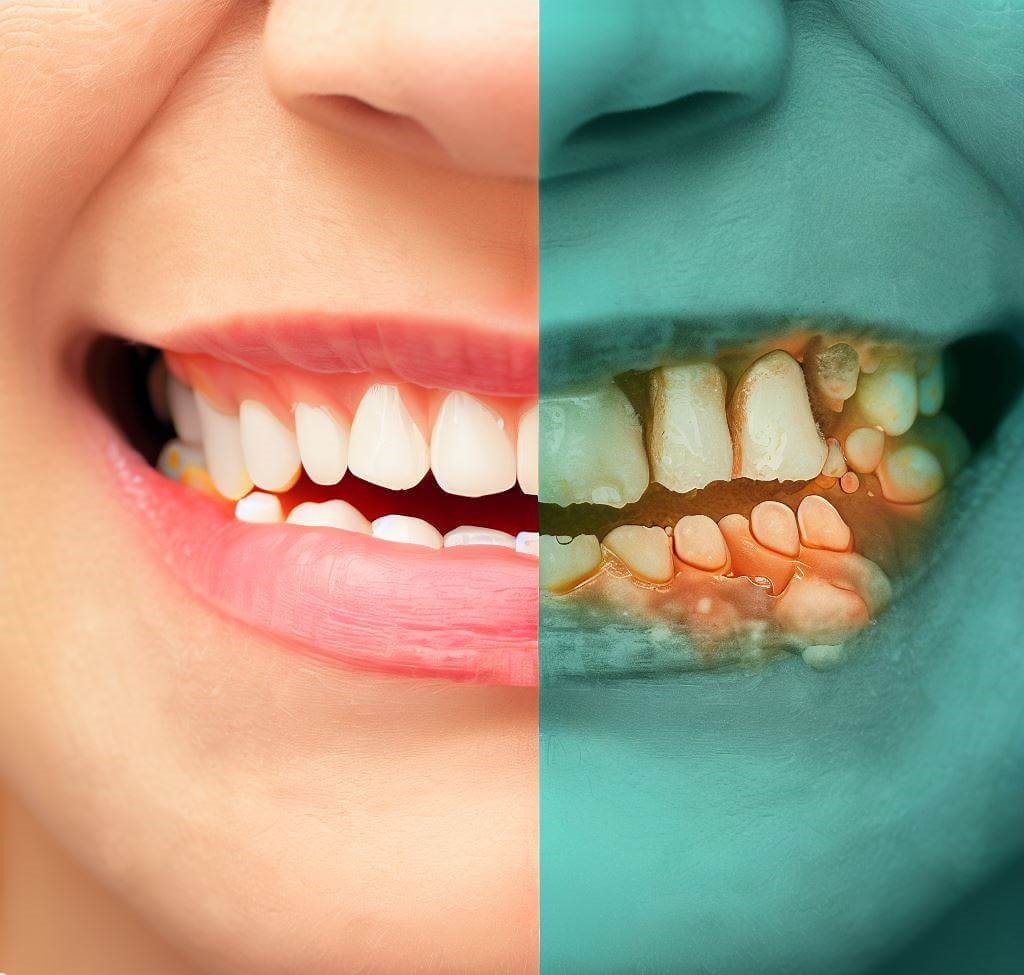Importance of Dental Health in Diabetes Management
When it comes to managing diabetes, most people focus on blood sugar levels, diet, and physical activity. While these are undeniably essential aspects, the importance of dental health often goes unnoticed. According to research published in the Journal of Periodontology, individuals with poor oral health have a higher risk of developing diabetes. Inversely, having diabetes increases the risk of experiencing severe periodontal (gum) diseases.
Diabetes affects your body’s ability to process sugar. The relationship between diabetes and dental health hinges on blood sugar control. Poorly controlled blood sugar can lead to higher glucose levels in saliva, creating a fertile breeding ground for bacteria, and potentially leading to plaque formation and gum disease.
In a study published in the Diabetes Care journal, researchers found that treating periodontal disease could help improve blood sugar control, thereby playing a role in diabetes management. By giving due attention to dental health, you’re not just saving your teeth; you might also be gaining better control over your diabetes.
Understanding the Link: Diabetes and Oral Health
Understanding the connection between diabetes and oral health is essential for comprehensive diabetes management. Both conditions can create a vicious cycle if not properly managed. Diabetes affects your mouth, and what happens in your mouth can affect your diabetes.
How Diabetes Affects Oral Health
Diabetes can have a pronounced effect on oral health due to high levels of blood sugar. Elevated blood sugar levels can lead to higher levels of glucose in saliva, which, in turn, promotes bacterial growth. These bacteria produce acids that attack tooth enamel, leading to tooth decay and other oral issues.
The Vicious Cycle: Poor Oral Health and Diabetes
Interestingly, the relationship between diabetes and oral health is bidirectional. A study in the Journal of the American Dental Association found that inflammation originating from severe periodontal disease can lead to insulin resistance. Insulin resistance can then exacerbate diabetes symptoms, making it more challenging to manage blood sugar levels.
In essence, poorly managed diabetes can lead to dental issues, and untreated dental issues can complicate diabetes management. Understanding this link is crucial, as it empowers individuals to take proactive measures to manage both conditions effectively.

Common Dental Problems in Diabetic Patients
Living with diabetes places you at a higher risk for a variety of dental issues. Research confirms that the prevalence of dental diseases is higher among diabetics compared to non-diabetics. Let’s delve into some common dental problems that diabetic patients often encounter.
Gum Disease
Also known as periodontal disease, gum disease is a chronic inflammatory condition that affects the gums and bone structure supporting the teeth. According to a study in the Journal of Diabetes Investigation, people with poorly controlled diabetes are three times more likely to develop severe periodontal diseases. Symptoms include red, swollen gums that bleed easily during brushing or flossing.
Tooth Decay
A study published in the Journal of the American Dental Association found that diabetics are at a higher risk for cavities. This is primarily because elevated blood sugar levels lead to higher glucose levels in saliva, providing more food for bacteria that produce tooth-decaying acids.
Dry Mouth
Dry mouth, or xerostomia, is a common issue affecting diabetic patients. A study in the Oral Diseases journal found that xerostomia was significantly more prevalent in diabetic patients compared to a control group. The condition can make eating and speaking difficult, contribute to tooth decay, and even lead to mouth sores.
Why Diabetics Are More Susceptible to Dental Issues
The reasons behind the increased risk of dental issues among diabetics are rooted in the physiological changes that diabetes brings about in the body. Here are some key factors, backed by scientific research.
High Blood Sugar Levels
High blood sugar levels create a conducive environment for bacteria to thrive in the mouth. When your blood sugar levels are high, your saliva also has higher glucose levels, providing ample food for bacteria. According to research published in the Diabetes Care journal, elevated glucose levels in saliva are positively correlated with higher rates of tooth decay.
Poor Immune Response
Diabetes can compromise the immune system, making it more challenging for the body to fight off infections, including those that begin in the mouth. A study in the Journal of Clinical Periodontology found that the immune response in diabetic patients was compromised when it came to fighting off oral infections, making them more susceptible to conditions like periodontal disease.
By understanding these risk factors and how they operate, diabetic patients can take more targeted steps to prevent dental issues from arising or worsening. It also underscores the need for regular dental check-ups, especially for those managing chronic conditions like diabetes.
Prevention and Management
Preventing dental issues is not just beneficial for your oral health but also crucial in effectively managing diabetes. Below are some ways to proactively tackle the problem, supported by scientific evidence.
Regular Dental Check-ups
Routine dental visits are crucial for everyone but especially so for diabetics. According to the American Diabetes Association, dental check-ups every six months can help in the early detection and treatment of oral health issues. These regular visits allow for professional teeth cleaning, which can remove plaque and tartar that daily brushing and flossing might miss.
Proper Oral Hygiene
Good oral hygiene practices are the cornerstone of dental health. A study in the Journal of Periodontology found that diabetic patients who practiced good oral hygiene had a lower risk of developing periodontal disease. Make sure to brush your teeth at least twice a day with fluoride toothpaste and use dental floss or an interdental cleaner daily to remove plaque between teeth.
Blood Sugar Control
Controlling your blood sugar levels is vital in preventing oral health issues. Research published in the Journal of the American Dental Association found that good glycemic control in diabetic patients reduced the occurrence of periodontal diseases. Therefore, adhere to your medication schedule and monitor your blood sugar levels regularly.
Dietary Choices for Better Dental Health
Your diet plays a pivotal role in both diabetes management and dental health. The foods you consume can affect your blood sugar levels and also have a direct impact on the health of your teeth and gums.
Foods to Include
According to the American Dental Association, a balanced diet rich in fruits, vegetables, lean protein, and low-fat dairy can help manage blood sugar levels and promote better dental health.
- Leafy Greens: Rich in calcium and folic acid, leafy greens like spinach and kale can strengthen your teeth and gums.
- Nuts and Seeds: Almonds and sunflower seeds are excellent sources of protein and calcium while being low in sugar.
- Dairy Products: Cheese, milk, and yogurt are high in calcium and protein, which are good for your teeth.
Foods to Avoid
Research published in the Journal of Dental Research indicates that sugar intake is strongly associated with dental decay. Reducing the consumption of the following can be beneficial:
- Sugary Beverages: Drinks like soda and fruit juices are high in sugar and can erode tooth enamel.
- Starchy Foods: Foods like bread and pasta can quickly break down into sugar and lead to tooth decay.
- Candy and Sweets: These are obvious culprits when it comes to high sugar content and should be consumed minimally.
The Role of Medication
Medication plays a crucial role in diabetes management and, by extension, dental health. Different types of medications come with various implications for oral care. Understanding these can help in preventing or managing dental issues effectively.
Insulin and Oral Health
Insulin is a common medication used to manage blood sugar levels in diabetic patients. According to a study published in the Journal of Clinical Periodontology, effective blood sugar management through insulin can also reduce the risk of periodontal diseases. When blood sugar is controlled, there’s less likelihood for elevated glucose levels in saliva, which can lead to dental problems like gum disease and tooth decay.
Oral Medication and Dental Issues
Besides insulin, oral medications like Metformin are often prescribed for diabetes management. Some of these medications can cause dry mouth as a side effect, according to research in the Journal of Oral Pathology & Medicine. Dry mouth can increase the risk of dental decay and gum disease, making it even more vital for patients on oral diabetes medications to maintain good oral hygiene and stay hydrated.
Importance of Communication
Effective communication is often an overlooked aspect of healthcare, yet it’s essential for successful diabetes and dental health management. Here’s why:
Between You and Your Dentist
Your dentist needs to be aware of your diabetic condition and any medications you’re taking. A study in the Journal of the American Dental Association suggests that knowledge about a patient’s diabetic condition can influence the dentist’s choice of treatment and preventive measures. This could include more frequent check-ups and specific dental procedures that are safer for diabetic patients.
Between You and Your Endocrinologist
Your endocrinologist, the doctor specializing in diabetes care, should also be informed about your dental health and any treatments you’re undergoing. For instance, certain dental procedures may require you to fast, which could impact your blood sugar levels. According to the American Diabetes Association, communication between healthcare providers can result in more coordinated care, which is especially important for diabetics who are at risk for various complications, including dental issues.
By maintaining open channels of communication with your healthcare providers, you’re better equipped to manage both diabetes and dental health. This collaborative approach can lead to more personalized and effective treatment plans, thereby improving your overall well-being.

Pros and Cons of Dental Treatment Options for Diabetics
Dental treatments for diabetics are generally similar to those for non-diabetics, but the implications can be different due to the nature of diabetes. Here are some commonly considered dental treatment options and what diabetics should know about them.
Professional Dental Cleaning
Regular dental cleanings are crucial for maintaining good oral health, especially for diabetics who are at a higher risk of developing dental issues.
Pros:
- Effective Plaque and Tartar Removal: Professional cleanings can remove plaque and tartar build-up that regular brushing and flossing might miss, reducing the risk of gum disease.
- Early Detection: Regular cleanings allow your dentist to monitor your oral health closely, making it easier to detect and treat problems early.
Cons:
- Temporary Sensitivity: Dental cleanings can sometimes result in temporary tooth sensitivity.
- Cost: Depending on your insurance, professional cleanings can be an out-of-pocket expense, which may be a concern for some patients.
Dental Implants
Dental implants are often considered for replacing missing teeth. They offer a more permanent solution than dentures.
Pros:
- Natural Appearance: Dental implants look and feel like natural teeth.
- Long-lasting: With proper care, dental implants can last many years, making them a more permanent solution.
Cons:
- Expensive: Implants are one of the more costly dental treatments.
- Risk of Infection: Any surgical procedure carries the risk of infection, and this is heightened for diabetics who generally have slower healing rates.
Tooth Extraction
Tooth extraction may be necessary for severely damaged or infected teeth.
Pros:
- Quick Solution: Extraction offers a quick way to remove a problematic tooth, alleviating pain and preventing the spread of infection.
- Cost-Effective: Compared to treatments like root canals and implants, extractions are generally less expensive.
Cons:
- Loss of Natural Tooth: Losing a natural tooth is a significant event and can affect your bite and the alignment of other teeth.
- Post-Operative Complications: Diabetics are at a higher risk for complications such as dry socket and slower healing post-extraction.
By understanding the pros and cons of these dental treatment options, diabetics can make more informed decisions in consultation with their healthcare providers. Given the added complexities that diabetes brings, it’s crucial to weigh these factors carefully and discuss them thoroughly with your dentist and endocrinologist.

The Final Word: Sustaining a Healthy Smile
Summary of Key Points
By now, the importance of dental health in the context of diabetes should be crystal clear. From understanding the link between the two conditions to taking proactive steps for prevention and management, it’s evident that your oral health is a significant piece of the diabetes management puzzle.
Encouragement to Act
If you’re a diabetic, don’t let dental health fall by the wayside. A radiant smile is not just an aesthetic asset but also a sign of good health. By making oral care a priority, you’re taking a holistic approach to managing diabetes. Your mouth is a mirror reflecting your overall well-being, so make it a point to keep that reflection as healthy as possible.
Unveiling the Final Layer: Your Smile and Your Life
Your smile is a vital part of who you are; it’s often the first thing people notice about you. When you take steps to manage your diabetes and dental health effectively, you’re doing more than just preserving your smile; you’re improving your quality of life. A healthier you can engage more fully in the activities you love, spend quality time with loved ones, and experience life with fewer limitations. So, what’s stopping you from smiling bright?
FAQs
- Is it safe for diabetics to undergo extensive dental procedures?
While diabetics can generally undergo dental procedures, it’s crucial to consult with both your dentist and endocrinologist to ensure it’s safe for you specifically. - Can improving my dental health help in better diabetes management?
Yes, there is scientific evidence to suggest that better dental health can improve your ability to manage diabetes effectively. - How can I mitigate the side effects of diabetes medication on my dental health?
Keeping your mouth hydrated and maintaining excellent oral hygiene can help mitigate side effects like dry mouth caused by diabetes medications. - Is it necessary to inform my dentist about my diabetic condition?
Absolutely, your dentist needs to know about your diabetic condition to provide the most appropriate and safe treatment for you. - Do diabetic children also face the same dental health risks as adults?
Yes, diabetic children are also at risk for dental issues like gum disease and cavities, making early dental care essential.





